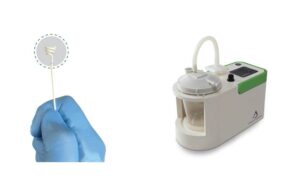
The company can now move forward with a pivotal trial for the JuxtaFlow RAD for treating cardiac surgery patients with renal insufficiency. This IDE follows FDA breakthrough device designation for JuxtaFlow in April.
Bahamas-based Roivios designed JuxtaFlow to improve treatments for patients facing kidney disease during cardiac surgery. JuxtaFlow uses a unique, gentle negative pressure technique on the kidneys’ urine-collecting system. It enhances function and shield against hypoxia-induced damage under acute conditions.
JuxtaFlow combines a catheter and pump system. A trained urologist inserts the catheters in a manner similar to ureteral stent placement. Then, the catheter connects to the pump to deliver the negative pressure. Roivios designed the negative pressure to transmit through the nephrons, reducing downstream hydrostatic pressure. Controlled pressure reduction allows for effective filtration and selective reabsorption.
The company’s GRADIENT trial aims to address the need for renal support among patients cardiopulmonary bypass (CPB). The study will be a prospective, multicenter, randomized, controlled, open-label trial. Roivios plans to look at JuxtaFlow’s safety and effectiveness in sustaining or enhancing renal function during and following CPB surgery.
“Achieving breakthrough device designation was instrumental in securing IDE approval,” said John Erbey, CEO at Roivios. “This initiative is the culmination of a decade of technological and clinical advancements in addressing kidney disease management challenges. Our ongoing dialogue with the FDA is paving the way for more effective management, empowering patients to thrive. We are eager to commence IDE enrollment and explore the JuxtaFlow RAD’s potential to improve surgical outcomes and enhance patient quality of life.”
